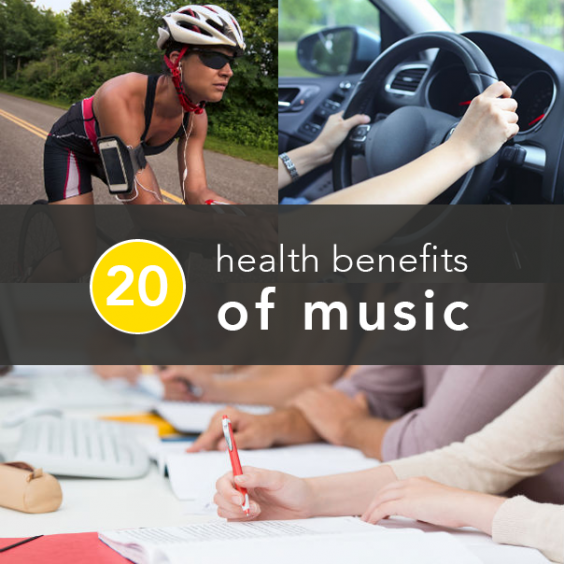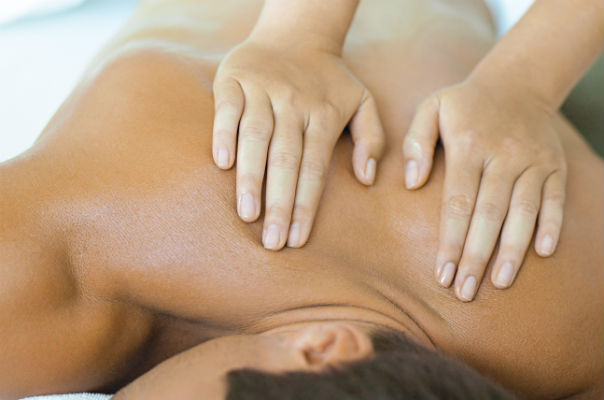"One good thing about music, is when it hits you, you feel no pain."
Judging from the quote above, Bob Marley was part poet, part scientist. That’s because there’s truth to his head-bobbing lyrics from the song Trenchtown Rock. Research suggests that music not only helps us cope with pain — it can also benefit our physical and mental health in numerous other ways. Read on to learn how listening to tunes can ramp up your health.
RESEARCH SUGGESTS THAT MUSIC CAN...
Help Physically:
1. Ease pain. Music can meaningfully reduce the perceived intensity of pain, especially in geriatric care, intensive care, or palliative medicine (an area of healthcare that focuses on preventing and relieving the suffering of patients) .
2. Motivate people to bike harder. A study of healthy male college students found that, while riding stationary bicycles, the participants worked harder while listening to fast music . Extra bonus: They also enjoyed the music more.
3. Improve running motivation and performance. Here’s an easy way to beat your best time if you’re a runner: Listen to your favorite “pump-up” music. Listening to music may help people run faster, boost their workout motivation, and enhance their endurance .
4. Increase workout endurance. Listening to those top workout tracks can boost physical performance and increase endurance during a tough exercise session . This works partly through the power of distraction: When we're focusing on a favorite album, we may not notice that we just ran an extra mile .
5. Speed up post-workout recovery. One study found that listening to music after a workout can help the body recover faster . While slow music produced a greater relaxation effect post-exercise, it seems that any kind of music can help the physical recovery process.
6. Improve sleep quality. Listening to classical music has been shown to effectively treat insomnia in college students, making it a safe, cheap alternative to sleep-inducing meds .
7. Help people eat less. One study found that playing soft music (and dimming the lights) during a meal can help people slow down while eating and ultimately consume less food in one sitting (perhaps because slowing down helps them to be more mindful of fullness cues) .
8. Enhance blood vessel function. Scientists have found that the emotions patients experience while listening to music have a healthy effect on blood vessel function. Music both made study participants feel happier and resulted in increased blood flow in their blood vessels.
Help Mentally:
9. Reduce stress. Research has found that listening to music can relieve stress by triggering biochemical stress reducers (think of these physiological processes as anti-stress ninjas) .
10. Induce a meditative state. Listening to slow musical beats can alter brainwave speed, creating brainwave activity similar to when a person is meditating or in a hypnotic state. Some research suggests that using rhythmic stimuli (such as music) to induce these states can have a therapeutic effect, easing symptoms of migraines, PMS, and even behavioral issues .
11. Relieve symptoms of depression. When you’re feeling down in the dumps, music can help pick you up (much like exercise) . Research suggests the kind of music matters: Classical and meditative sounds seem to be particularly uplifting, whereas heavy metal and techno can actually make depressive symptoms worse.
12. Elevate mood. A 2013 study found that music helped put people in a better mood and get in touch with their feelings . Study participants rated “arousal and mood regulation” and “self-awareness” as the two most important benefits of listening to music.
13. Improve cognitive performance. Background music may enhance performance on cognitive tasks . One older study found that listening to music allowed test takers to complete more questions in the time allotted, and get more answers right . More recent research suggests that whether or not music improves cognitive function depends on whether the music first improves a person’s emotional state.
14. Help people perform better in high-pressure situations. Want to sink the game-winning shot when the pressure’s on? Listen to some upbeat tunes before the big game. One study found that basketball players prone to performing poorly under pressure during games were significantly better during high-pressure free-throw shooting if they first listened to catchy, upbeat music and lyrics.
15. Reduce anxiety as much as a massage. One study found that music’s effect on anxiety levels is similar to the effect of getting a massage . Here’s an idea: Treat yourself to a massage and bring your favorite chilled out tunes to play during the session. Double the relaxation!
16. Relax patients before surgery. One study found that listening to music helped put cardiovascular surgery patients at ease as they awaited their operations . That’s a major benefit for the nearly four million people who get heart surgery each year in the U.S.
17. Ease stress after surgery. Music isn’t only helpful pre-surgery. Another study revealed that listening to music while resting in bed after open heart surgery helped relax patients and decrease their stress levels.
18. Elevate mood while driving. Listening to music while driving can positively impact mood . So when you’re feeling cranky in the car, try cranking some of your favorite tunes.
19. Help cancer patients manage stress and anxiety. Music has been found to help cancer patients communicate their feelings, manage stress, and ease physical pain and discomfort . It can also reduce anxiety and improve their quality of life .
20. Ease recovery in stroke patients. Researchers in Finland concluded that when stroke patients listened to music for two hours a day, their verbal memory and attention improved and they had a more positive mood compared to patients who didn’t listen to music or who listened to audio books .
Regardless of your taste in music, it’s clear that tunes benefit our health. The best part? Now you have an excuse for blaring Beethoven while your roommate is trying to study.
source : http://greatist.com/happiness/unexpected-health-benefits-music
















.jpg)
.jpg)



.jpg)




0 comments:
Post a Comment
Note: Only a member of this blog may post a comment.